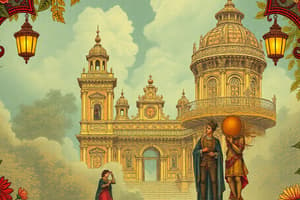Podcast
Questions and Answers
What was the primary role of the Alcalde Mayor in the governance structure of the Philippines during colonial times?
What was the primary role of the Alcalde Mayor in the governance structure of the Philippines during colonial times?
- To represent the King and govern the province. (correct)
- To collect taxes on behalf of the council.
- To lead the town as a religious figure.
- To oversee the local judicial matters.
Which social class in the Spanish colonial Philippines was composed of full-blooded Spaniards born in the Philippines?
Which social class in the Spanish colonial Philippines was composed of full-blooded Spaniards born in the Philippines?
- Insulares (correct)
- Peninsulares
- Indios
- Ilustrados
What was the primary function of the Visitador in the colonial government of the Philippines?
What was the primary function of the Visitador in the colonial government of the Philippines?
- To act as a local judge.
- To supervise the performance of the Governor General. (correct)
- To provide humanitarian assistance to Filipinos.
- To collect taxes from the residents.
What distinguishes the Ilustrados from other social classes in the colonial Philippines?
What distinguishes the Ilustrados from other social classes in the colonial Philippines?
In the context of colonial governance, which entity had the ultimate authority over the Philippines?
In the context of colonial governance, which entity had the ultimate authority over the Philippines?
What was one of the main factors that led to the emergence of Filipino nationalism?
What was one of the main factors that led to the emergence of Filipino nationalism?
Which individual is best associated with promoting liberalism in the Philippines during the period discussed?
Which individual is best associated with promoting liberalism in the Philippines during the period discussed?
What was the main result of the execution of GOMBURZA?
What was the main result of the execution of GOMBURZA?
Which of the following terms refers to the forced labor system enacted upon Filipino males aged 16-60?
Which of the following terms refers to the forced labor system enacted upon Filipino males aged 16-60?
What is the primary objective of Republic Act 1425, also known as the Rizal Law?
What is the primary objective of Republic Act 1425, also known as the Rizal Law?
Study Notes
Key Historical Events and Figures
- Opening of Philippine World Trade marked the beginning of economic opportunities and exchanges.
- Liberal ideas began to circulate, challenging traditional governance and advocating for reforms.
- Carlos Maria Dela Torre played a significant role in spreading liberalism among Filipinos, advocating for reforms in education and governance.
- General Rafael de Izquierdo opposed Dela Torre's liberal methods, firmly rooted in conservatism, reflecting the ideological divide.
Filipino Nationalism
- The Cavite Mutiny is viewed as a pivotal event in the emergence of Filipino nationalism, leading to the Philippine Revolution against Spanish rule.
- GOMBURZA refers to three Filipino priests (Gomez, Zamora, and Burgos) who fought for equal rights and were executed by garrote, becoming martyrs in the Filipino struggle.
- Fr. Mariano Gomez was the head priest in Bacoor; he was 72 years old and among the wealthiest in his region.
- Fr. Jacinto Zamora served as the head priest in Marikina and was 36 years old at the time of execution.
- Fr. Jose Burgos, brother to Jose Rizal, was honored by Rizal in his novel El Filibusterismo, demonstrating the interconnectedness of their legacies.
Social and Economic Inequities
- Unjust policies like Polo y Servicios mandated forced labor where men aged 16-60 had to work for the government for 10 days a year unless compensated via a fee.
- The Encomienda system allowed Spanish settlers to extract forced labor from indigenous populations.
- Spanish friars owned vast haciendas, one of the wealthiest landholding groups in the Philippines.
Legislation and National Concerns
- Bandala enforced compulsory sales of products to the Spaniards at low prices, further isolating Filipino farmers.
- The Rizal Law (Republic Act 1425) was enacted to include the studies of Jose Rizal's works in educational curriculums, promoting nationalism and character development among youth.
- Objectives of the Rizal Law include instilling ideals of freedom, honoring Rizal’s contributions to Filipino identity, and serving as a source of patriotism.
Political Structure and Governance
- The political structure included Alcalde Mayor overseeing provinces and Goberndorcillo managing towns, reflecting a hierarchical administration.
- The Cabesa de Barangay was responsible for tax collection without any compensation.
- Hierarchies based on birthright divided society into Peninsulares, Insulares, Creoles, Ilustrados, and Indios, each with varying degrees of power and privilege.
- Council of Indies managed colonial affairs, while key positions like Gobernador General held ultimate authority in the Philippines.
Historical Context
- Spanish colonization spanned over three centuries, characterized by centralized governance and extensive control over resources and people.
- The impact of the Industrial, French, and American Revolutions influenced local aspirations for change and independence.
- Liberalism emerged as a philosophy prioritizing individual rights and freedoms, while conservatism sought to maintain traditional social structures and values.
Justice and Legal Framework
- Maladministration of justice allowed inequitable access, favoring the affluent and creating disparities in legal proceedings.
- Penal codes were often manipulated, reflecting the broader context of power and privilege within the colonial system.
Studying That Suits You
Use AI to generate personalized quizzes and flashcards to suit your learning preferences.
Description
This quiz explores key factors in Philippine history, focusing on the opening of trade and the influence of liberal ideas. It also contrasts the philosophies and methods of significant figures like Carlos Maria dela Torre and General Rafael de Izquierdo. Test your knowledge on how these ideologies shaped Filipino nationalism.



